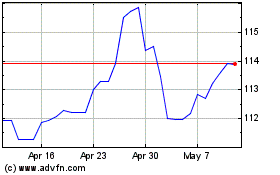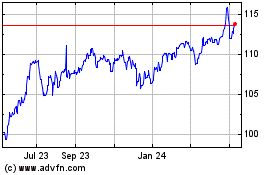Commodity Currencies Fall As Asian Stock Markets Traded Lower
September 05 2017 - 10:42PM
RTTF2
Commodity currencies such as the Australian, the New Zealand,
and the Canadian dollars weakened against their major rivals in the
Asian session on Wednesday as Asian stock markets traded lower.
This was due to the overnight sell-off on Wall Street amid
geopolitical concerns following North Korea's nuclear test on
Sunday.
Investors also kept an eye on Hurricane Irma, which is bearing
down on the Caribbean islands and Florida, just a week after
Hurricane Harvey disrupted refineries along the Texas coast.
On the economic front, the Australian Bureau of Statistics said
that Australia's gross domestic product expanded a seasonally
adjusted 0.8 percent on quarter in the second quarter of 2017. That
was shy of expectations for 0.9 percent, but up from 0.3 percent in
the first quarter.
Data from ANZ New Zealand showed that New Zealand's job ads
recovered in August. Job ads increased 1 percent month-on-month to
a new record high in August, the bank said. The monthly increase
reversed a 0.9 percent fall in July.
In the Asian trading, the Australian dollar fell to an 8-day low
of 86.69 against the yen, from yesterday's closing of 86.99. The
aussie may test support around the 84.00 region.
Against the euro and the U.S. dollar, the aussie dropped to
0.7976 and 1.4929 from yesterday's closing quotes of 0.7995 and
1.4897, respectively. If the aussie extends its downtrend, it is
likely to find support around 0.77 against the greenback and 1.52
against the euro.
The aussie slipped to 0.9886 against the Canadian dollar, from
an early 6-day high of 0.9926. On the downside, 0.96 is seen as the
next support level for the aussie.
Against the NZ dollar, the aussie edged down to 1.1031 from an
early high of 1.1067. This may be compared to an early 6-day low of
1.1025. The aussie is likely to find support around the 1.09
region.
The NZ dollar fell to 0.7222 against the U.S. dollar and 78.49
against the yen, from yesterday's closing quotes of 0.7235 and
78.72, respectively. If the kiwi extends its downtrend, it is
likely to find support around 0.70 against the greenback and 76.00
against the yen.
Against the euro, the kiwi dropped to 1.6488 from yesterday's
closing value of 1.6463. The kiwi may test support near the 1.67
region.
The Canadian dollar fell to a 6-day low of 87.65 against the
yen, from yesterday's closing value of 87.92. The loonie could find
support around the 86.00 region.
Against the U.S. dollar and the euro, the loonie dropped to
1.2398 and 1.2398 from yesterday's closing quotes of 1.2374 and
1.2374, respectively. If the loonie extends its downtrend, it is
likely to find support around 1.27 against the greenback and 1.50
against the euro.
Looking ahead, Canada and U.S. trade data for August and U.S.
services PMI for August are due to be released in the New York
session.
The Bank of Canada will announce its interest rate decision at
10:00 am ET. Economists expect the bank to retain interest rates
unchanged at 0.75 percent.
At 2:00 pm ET, U.S. Federal Reserve releases Beige Book
report.
CAD vs Yen (FX:CADJPY)
Forex Chart
From Mar 2024 to Apr 2024

CAD vs Yen (FX:CADJPY)
Forex Chart
From Apr 2023 to Apr 2024
